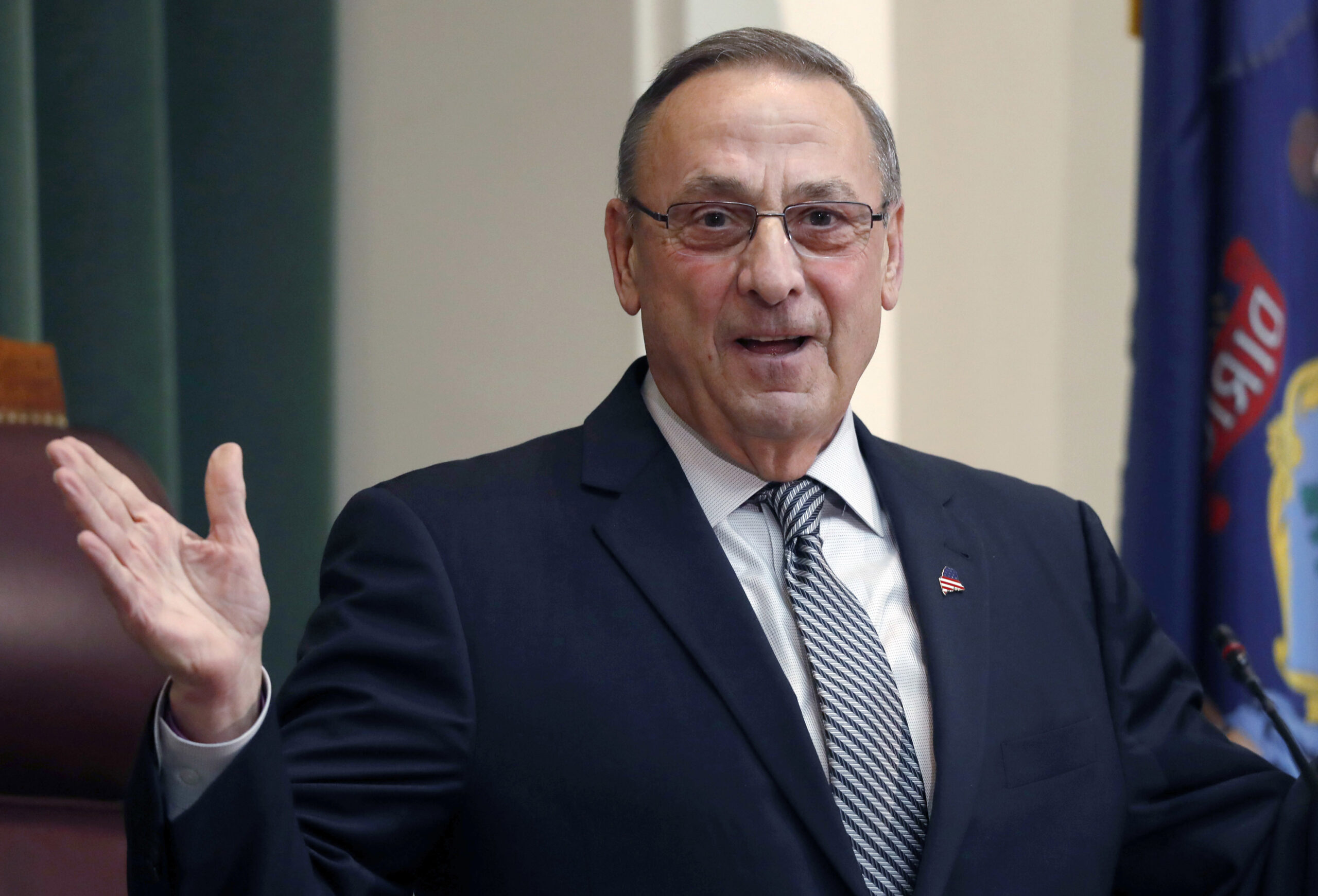
Former Maine Gov. Paul LePage pardoned his late mentor’s grandson in the final days of his second four-year term, according to documents obtained by The Associated Press that detail pardons for crimes including drug trafficking, tax evasion and embezzlement of public funds.
The secretary of state recently released a list of 112 people who were pardoned by the Republican former governor in response to a Freedom of Access Act request by the AP seeking pardons covering LePage’s eight-year tenure as governor. Previously, the state had confirmed the name of only one individual on the list.
Jim Campbell, director of the Maine Freedom of Information Coalition, said he was pleased the pardons were released. He didn’t see any justification for withholding them in the first place.
[Subscribe to our free morning newsletter and get the latest headlines in your inbox]
“We don’t believe that withholding information, absent an extremely strong justification for doing so, is the right way to conduct government business,” Campbell said Wednesday.
A message was left seeking comment from representatives for LePage, who left office in January.
In the past, Maine governors have typically released the names of individuals pardoned in high-profile cases. But the office of the secretary of state under new Gov. Janet Mills, a Democrat, said after the AP asked for the records in early January that a change in state law in 2017 prevented the release of its archives of LePage’s pardons.
The Mills administration changed course, however, and released the full list after the AP invoked Maine’s open records law. Mills also signed a March 15 executive order allowing for the release of pardons upon request and subject to review by the administration.
LePage publicly railed against drug dealers, whom he joked should face the guillotine. Records show LePage issued over a half-dozen pardons for trafficking of drugs such as OxyContin, cocaine and marijuana, the latter of which is now legal in Maine.
LePage, who fought against the state income tax, also pardoned two individuals convicted of evading or failing to pay taxes.
In his last week, LePage pardoned eight individuals for crimes ranging from theft to trafficking of synthetic hallucinogenic drugs. LePage also pardoned a man accused of abusing his infant son; medical experts contended his son suffered from a genetic condition making him susceptible to fractures. LePage had pushed hard for reforms to Maine’s child protective system, which drew criticism after two girls died in late 2017 and early 2018.
An analysis by the AP indicates 60 percent of 240 pardons for 112 individuals were for minor crimes — the oldest of which was in 1960 — but the list included about two dozen serious felonies.
Among those was Jean Lettre, who embezzled several thousand dollars as a county sheriff secretary in 1992. Now, she’s working as a licensing supervisor for the Maine Department of Marine Resources and said she’s no longer a “kid.”
LePage pardoned her Dec. 27.
“It made me a better person because I had to prove myself to myself, and to everyone else, every single day for 27 years,” Lettre, 51, said.
[Read the full list of LePage’s pardons here]
Another of LePage’s last acts was to pardon the grandson of late Bruce Myrick, who mentored and sheltered the future governor when he ran away from home to escape abuse.
On Dec. 31, he pardoned Myrick’s grandson, Jeremy Mills, for operating under the influence and driving when his license was suspended or revoked. Mills didn’t return a message seeking comment.
Individuals seeking pardons are required to place legal notices about their public hearings in local newspapers, but those often don’t attract attention. The AP was unable to locate notices for three individuals pardoned in LePage’s last week.
The only person previously known to have been pardoned by LePage was a Republican former state lawmaker. The governor went against a clemency board’s recommendation in his final days to pardon the former lawmaker, Jeff Pierce, for a 35-year-old felony drug trafficking conviction.
The pardon was first reported by Maine Public, and then confirmed by the lawmaker and LePage’s office. A message was left with Pierce seeking comment.
The number of pardons is in sync with LePage’s immediate predecessors, who both also served two full, four-year terms.
Former Democratic Gov. John Baldacci issued 218 pardons to 141 people, while former independent Gov. Angus King, now a U.S. senator, issued 154 pardons to 100 people, the state says.
In addition to the pardons, LePage shortened the sentences of 21 inmates in 2017 and one in 2018, according to records provided by Maine’s Department of Corrections in February. That includes a woman who stole over $200,000 from a Bangor-area school district, and 17 male inmates conditionally released in the wake of LePage’s shuttering of a minimum-security prison in Washington County.
Several pardons helped out professionals and others worried about the impact of a past indiscretion on their careers. A financial broker, who was pardoned in 2013 for sneaking into the closed Topsham Fairgrounds with friends as a 19-year-old, had testified about concerns over his professional license.
George Newcomb, 67, of Livermore Falls said he was arrested as an accessory at 17 when his older brother broke into a business and stole $35 and a gun.
Newcomb said he decided to seek clemency when the youthful crime came back years later to haunt him. His record came to authorities’ attention while he was teaching a gun safety class. His criminal record barred him from owning guns, and authorities went to his home and seized his weapons.
“I got my pardon, so I’m a happy camper. I earned it,” he said. “That’s what behaving yourself will do for you. You get the reward.”
Associated Press writers David Sharp and Patrick Whittle contributed to this report.
This article originally appeared on www.bangordailynews.com.




